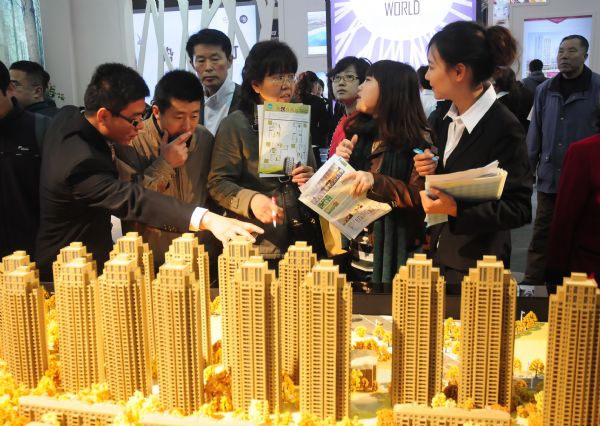China's property market hits a stalemate
China's property market seems to have reached a stalemate, with buyers waiting for price drops and developers postponing sales. Any development hinges on the government's ability to turn its vision into reality.
 |
|
Visitors talk with property agents about a housing project during a Spring real estate fair in Dalian, northeast China's Liaoning Province, April 7, 2011. [Lu Wenzheng/Xinhua] |
The State Council, or China's Cabinet, last week pledged to maintain macro control over the runaway property market.
The government has adopted various measures to curb rising property prices, including restricting residents in 35 major cities from buying second or third homes, higher down payment requirements for mortgages, property taxes in Chongqing and Shanghai, as well as a slew of monetary policies that have raised developers' borrowing costs.
To offer more houses that are affordable for the public, the central government has allocated 103 billion yuan (15.6 billion U.S. dollars) for the construction of 10 million affordable housing units this year.
While the government's policies have eased rising prices in some cities, authorities are pressing for a down-to-earth implementation of the policies.
Complicated picture
The tightening policies have made some noticeable differences.
In Beijing, the average transaction price dropped 26.7 percent from February to March due to the absence of speculative investment, according to the city's property transaction management authorities.
Another factor behind the drop was that transactions had mostly moved from downtown areas to the suburbs, according to dealers from local property companies. Prices of houses in the city center barely changed and prices of resold houses rose slightly, they said.
Seven of 70 medium- and large-sized cites registered a one-percent price increase in February, a traditionally slow season for property sales.
Still, sales tumbled in some cities. In the southern city of Guangzhou, sales of newly built commercial houses dwindled by nearly 40 percent in the first quarter, and in the eastern metropolis of Shanghai sales of primary residential houses fell by almost half.
Apparently, the government is not happy with the situation as in some cities, the price rise has not been checked.
 0
0 






